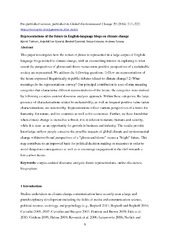| dc.contributor.author | Fløttum, Kjersti | |
| dc.contributor.author | Gjerstad, Øyvind | |
| dc.contributor.author | Gjesdal, Anje Müller | |
| dc.contributor.author | Koteyko, Nelya | |
| dc.contributor.author | Salway, Andrew | |
| dc.date.accessioned | 2017-09-15T12:59:39Z | |
| dc.date.available | 2017-09-15T12:59:39Z | |
| dc.date.issued | 2014-11 | |
| dc.Published | Fløttum KF, Gjerstad Ø, Gjesdal AM, Koteyko, Salway A. Representations of the future in English language blogs on climate change. Global Environmental Change. 2014;29:213-222 | eng |
| dc.identifier.issn | 0959-3780 | |
| dc.identifier.issn | 1872-9495 | |
| dc.identifier.uri | https://hdl.handle.net/1956/16639 | |
| dc.description.abstract | This paper investigates how the notion of future is represented in a large corpus of English-language blogs related to climate change, with an overarching interest in exploring to what extent the perspectives of gloom-and-doom versus more positive perspectives of a sustainable society are represented. We address the following questions: (1) How are representations of the future expressed linguistically in public debates related to climate change? (2) What meanings do the representations convey? Our principal contribution is a set of nine meaning categories that characterize different representations of the future: the categories were derived by following a corpus-assisted discourse analysis approach. Within these categories, the large presence of characterisations related to sustainability, as well as frequent positive value-laden characterisations, are noteworthy. Representa- tions reflect various perspectives of a future for humanity, for nature, and for countries as well as for economies. Further, we have found that when climate change is viewed as a threat, it is in relation to nature, humans and security, while it is seen as an opportunity for growth in business and industry. The results provide knowledge on how people conceive the possible impacts of global climate and environmental change within two broad perspectives of a ‘‘gloom-and-doom’’ versus a ‘‘bright’’ future. This may contribute to an improved basis for political decision making on measures in order to avoid dangerous consequences as well as to encourage engagement in the shift toward a low-carbon future. | en_US |
| dc.language.iso | eng | eng |
| dc.publisher | Elsevier | eng |
| dc.rights | Attribution CC BY-NC-ND | eng |
| dc.rights.uri | http://creativecommons.org/licenses/by-nc-nd/4.0/ | eng |
| dc.subject | Corpus-assisted discourse analysis | eng |
| dc.subject | Future representations | eng |
| dc.subject | Online discourses | eng |
| dc.subject | Blogosphere | eng |
| dc.title | Representations of the future in English language blogs on climate change | eng |
| dc.type | Peer reviewed | |
| dc.type | Journal article | |
| dc.date.updated | 2017-08-11T15:05:15Z | |
| dc.description.version | acceptedVersion | |
| dc.rights.holder | Copyright 2014 Elsevier Ltd. | eng |
| dc.identifier.doi | https://doi.org/10.1016/j.gloenvcha.2014.10.005 | |
| dc.identifier.cristin | 1170077 | |
| dc.source.journal | Global Environmental Change | |
| dc.relation.project | Norges forskningsråd: 220654 | |

